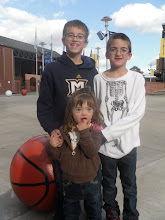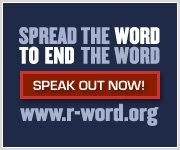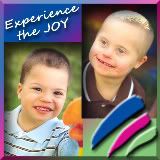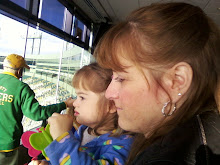I look back on my life and feel there are snapshots of moments predicting the entry of Quinn into my life. It is like looking at a scrapbook and seeing events captured in isolated photos all leading up to some ultimate life altering experience, such as school photos leading to a graduation, dating photos leading to a marriage, or pregnancy photos leading to a birth of a child. In reality there was no way to accurately predict that I would have a child with Down syndrome. It is only that these events are coincidence, but I still nonetheless feel drawn to reflect on these moments given Quinn’s entry into my life.
Two events stand out even prior to my birth. When I was inside my mother, there were three potential generations all together within one body. In the small part that would ultimately become Quinn, there was an extra 21st chromosome. Little did my mother know that she would set into motion a whole series of events that would have such an impact. Quinn was there with me way back when I entered this world; she just waited until 2007 to make her grand entrance. This is the story about how she guided me and led me to greater awareness and acceptance of those with disabilities.
I learned about the second prenatal event when I was entering young adulthood. At that time, my mother shared with me a story dating back to when she was pregnant and eagerly waiting for the arrival of my birth, her youngest child. She was no longer in her 20s at the time of the pregnancy. This joyful time was unfortunately clouded by an intense social relationship, more specifically, a person who said some hurtful things about me, my mother’s unborn child. This person was talking about my mother having a child at such an "old" age and stated that my mother's child would probably be "the r-word." My mother told me that she always thought this person was jealous, for this individual wanted another child. My mother's purpose in telling me this story was to tell me how one should treat others in less hurtful ways, but now I think back to this story and reflect upon something all together different. Was my mother relieved that she didn't have a child with a cognitive disability? Did she feel she dodged a bullet? I realize that most likely she felt this way, and I don't blame her. I probably would have felt the same. I was her only child who attended and graduated college, ultimately completing a Ph.D. - so maybe my mother saw some irony in this situation. The one who excelled academically was the same one that was wished to be cognitively disabled. What does this say about that social group at the time? If you are jealous of someone having a child, perhaps you might wish them to have a child with a disability? Would it be seen as the ultimate punishment? Maybe it is all fitting that out of my mother's four children, it is I who was the one who would go on to have a child with a disability, the one that someone wished would be cognitively disabled. It seemed like fate that Quinn would enter my life. When I was waiting to enter the world I was called "the r-word," and I am now the one fighting against that same word because of my own daughter.
The next photo is of me as a preschooler watching my absolute favorite television program, Sesame Street. I loved Grover, Ernie, and Bert. They were the best moment of my day and I adored watching them in the huge television set in the living room. My mother was always in the background telling me to move back, not sit too close to the screen, or take my feet off of the television set. Although I was unaware at the time, there is another figure way back in the shadows of this photo, Emily Perl Kingsley. Kingsley was a writer for Sesame Street, and had a son who had Down syndrome. She was an advocate of individuals with disabilities and helped influence others to cast children with disabilities, including Down syndrome, in the show. So here I was watching Emily Perl Kingsley’s work without knowing that she was there and what an impact she would have on me later in my life through her essay, Welcome to Holland. Thank you, Emily Perl Kingsley, for secretly being with me since I was a preschooler. Your essay gave me great comfort when I was pregnant with Quinn.
Continuing on with the story, we turn the page of the scrapbook. We see that the next photograph comes from my elementary school days. There is a photo of myself as a young girl attending the yearly Father’s Day family reunion picnic. I look around at the crowd and see a distant relative who cares for youth who are developmentally disabled. I have seen this woman before, but do not know her name. From this photograph it is obvious what I am thinking, I want to look, am drawn to look at them, but yet feel uncomfortable – like I shouldn’t be so interested. I wonder what it must be like to care for a child who has a disability. How would that feel? Why do people do it? Who is this woman, and why does she take care of these children? I try to concentrate on the conversation happening around me to distance myself from these thoughts, but I keep going back to watch this woman and these youth. I feel uncomfortable, yet intrigued. Did I know deep down that someday this would be me? Or is this just a normal reaction when noticing those who are “different?” There is another twist of fate in my story – I was once the person who could not stop staring, and now I will be the one that others stare at.
My awkward middle school days are the next section in the scrapbook. We see me as a young girl feeling unsure about my appearance. I look around the crowd and see other students my age, some appear more self-assured and look so beautiful; I envy those students. I also see other students just like me in the struggle they are experiencing. I feel a special bond with these students. Since I am all about my peers and what they are doing at this time in my life, I start noticing a group of students in school that I really don’t remember registering in my memory before – these are the students who are in special education, more specifically students who have cognitive disabilities. I notice them at various locations in the school hanging out together with no one from regular education talking to them. For example, although I see them in the lunch room sitting across the way, there seems to be a huge canyon separating us that no one tries to pass. Because appearance and my reduced self-esteem are at the forefront of my mind, I notice these students’ clothes, their hair, the glasses, and the way they look. The stereotype becomes sealed in my mind. This is something that I regret – I had that horrible stereotype, and it won’t be until almost another 25 years that I let some of it go. It is from this memory that I become obsessed with the idea that Quinn will have style. I know in the big scheme of things this may seem trivial, but this is built upon difficult feelings from my middle school years – the time I felt most unsure of myself. I also hope and pray that Quinn will have a totally different experience in middle school. I hope that the canyon no longer exists. I hope special education and regular education students will interact and enjoy each other’s company. Doesn’t almost everyone want their child to have a different experience than they did in middle school? I certainly do, and I will do everything I can to accomplish this; for me, the stakes are too high if I don’t.
In my school days, there was a student in my grade who had a physical disability. He is also present periodically throughout this scrapbook during this time period. I looked at him at the time as an outcast, as someone who was socially awkward, as different. I unfortunately felt that different equated bad. Now I look at these photos and realize that he really wasn’t this way – that was the way that we the other, supposedly more able-bodied students made him. He was just like us, but in a time where conformity was so important, we were overly judgmental and negative towards anyone who differed. My heart aches about this. No, actually I take that back – he wasn’t just like us; he was better than us. Now looking at his photo I see someone with such great strength, determination, and heart. I am ashamed that I didn’t possess these same qualities at this time of my life.
The next page is one that is worn. I regularly go back to this time since Quinn entered my life. The photo is of me in high school, sitting in biology class. The teacher is talking about something interesting today, about Down syndrome. Normally I am bored to tears, for I was an underachiever at that time – rarely interested in the subject at hand. However, this is a lesson from high school that I have kept will me for over 20 years. It was about something of interest to me, and although I didn’t know it at the time – of great significance. This topic of Down syndrome on that day in biology class makes me think about the woman at the Father’s Day reunion and the children in the cafeteria in middle school. It is rooted in my early experiences. It makes me think about the stereotypical haircut, glasses, and clothes. The teacher is telling us about what causes this – how it could happen to anyone. We learn about how it relates to mental retardation. I think how scary this must be given the fact that it can strike anywhere and at anytime, when you are just expecting a little one in your life – at a time when there should be happiness. Then the teacher continues and tells us that the life expectancy of individuals with Down syndrome is 25-years-old. This has stuck with me all these years – the life expectancy is only that long! Imagine only 25 years with your child! Then there is the thought that I have gone back to so much in the time Quinn has been with me – the reason why this page is so worn – “It must be sad to have a child like that.” Denial and egocentrism sets in, “Never mind, that won’t ever happen to me anyway.” I move on off that thought and into my own world again. How foolish I was. How many high school students today think the same way, only to fast forward in time and now learn that yes it will be you? Now looking back on this lesson in biology class, I know that times have changed. The teacher didn’t tell us that the reason why the life expectancy was so low was because the medical profession didn’t think it was worth their time and effort to provide needed treatment to this population – they were mentally retarded after all, so why bother. Sad, but it was the thought of the time. The teacher didn’t tell us about institutionalization, forced experimental treatments, and other mistreatment that this population had to endure. No, the lesson was missing important, essential information. But now I have a better teacher than I ever did in high school. I have a teacher that I am learning so much more from – the truth, the facts, the good, along with the bad. I have Quinn. And for this I am thankful. If all I ever knew about Down syndrome was from that biology class that day in high school, what kind of person would I be? I don’t even want to know.
The next section in the scrapbook comes from my undergraduate college years. We see photos showing different, new experiences which expand my understanding of diversity. Having come from a pretty homogeneous background, I finally met new people who had different backgrounds. Little did I know that this would later impact me with Quinn, for disability is just another area of diversity, just like race, gender, age, and sexual orientation.
In college I learn about special education law – that children with disabilities ages 3-21 are entitled to a free, appropriate education in the least restrictive environment. I, in a cognitive sense, understood that concept and set out to witness it firsthand in my fieldwork experience in education. This experience involved spending time in the special educational programs at a local high school. Unfortunately what I saw in my own personal experiences in middle and high school were apparent there at that school – seclusion, limited contact with other students, and stigma. I was intrigued by the children in these programs, but my heart also felt some pain and I realized that I didn’t fully emotionally understand the experience that I was witnessing. I wanted to distance myself. How could I fully understand this? I was just an outsider and had the belief that parenting a child like this would bring only pain and wasn’t in my future anyway. Today I have a better understanding of the parenting piece, and I hope things are different when it comes to the educational piece in the 15 years that have passed since that experience. I think, though, that I see something else in this photo now – I see the unfortunate difference between policy and reality. It is one thing to talk about the rights of individuals with disabilities and cite the law while sitting in the classroom or removed from the experience – but it is entirely something different to witness the acceptance and inclusion in the eyes and hearts of students and faculty when they are looking at your child. I hope I get to witness this for Quinn. I hope that when I look into the eyes of her classmates and teachers that I see love and acceptance. I hope that the school values her and learns from her as much as I have. And I hope that any fieldwork students in education who happen to be in her school can clearly see something different than I did when I was there.
Now the scrapbook moves on into my graduate school days. We see a photo of me sitting in class learning about intelligence tests, the diagnostic criteria of mental retardation, and other concepts associated with the field of school psychology. Little did I know that these things would someday serve me well in my role as Quinn’s mother. In one of my first classes, we watch the film Educating Peter, about Peter Gwazdauskas, a third grade student who has Down syndrome. The film is about his full inclusion in the classroom. It was an intense film to watch – we see the other children’s reactions to Peter, which were not always positive, Peter’s aggressive behavior towards the other children, but then his ultimate success in the classroom. This film created intense debate in the class as to whether full inclusion was an appropriate option or not. I remember sitting there all quiet and unsure about what I believed. Maybe I knew deep down that it would not be so easy and clear-cut for me. Maybe I knew what would be coming without being able to articulate this into words. I sat there during the discussion feeling uncomfortable, wondering why my professor showed this film to us and thinking about the difficulty Peter’s parents faced. Now looking back, I remember that my professor also had a daughter with a disability. Maybe she showed us this film to show us the complexity of the situation – her situation. Maybe give us an opportunity to see the parents’ side too. I missed an opportunity to ask her about her opinion, her experience. I regret this. I look at this section of the scrapbook and wish I could go back and do some things differently.
There is also another photo that represents yet another lost opportunity. My first client was a mother questioning the diagnosis of mental retardation for her daughter, a young elementary-aged student. I conducted the assessment according to best practice – interview, observation, standardized testing, and informal assessment measures. All pointed to the diagnosis being correct. I sat with the mother and explained the results. I saw the pain in her face despite her strong exterior. I felt that I did right diagnostically in the case, but now know that I would have been much more compassionate in my discussion of the results. I would allow her to tell her story. I would allow her to speak more about her feelings. I would talk about strengths and support. I know now I am a much better psychologist because I have Quinn in my life, but I regret missing these opportunities to be better that were in the past.
The last section of the scrapbook involves my adult life after college, but prior to Quinn’s arrival. We see a photo of a wedding day. The photo shows the wide smiles of a newly married couple, but I now know that the smiles would be far wider had we really known the three beautiful children that we would someday have – including the one that we would chose to have despite the scare of a prenatal diagnosis. We see photos of the birth of our two sons, who are blessed to have their beautiful sister. They will become better men because of her. I now realize that during pregnancy and childbirth I was naïve and took having a healthy baby for granted. Another lesson that I learned from Quinn, for it wasn’t until my third child that I truly realized that having a child is truly a miracle – this becomes perfectly clear when you have one that has 47 chromosomes.
In this section of the scrapbook we also see photos of my work with adolescents, some of whom had mild cognitive disabilities or learning disabilities. We can see the passion I have for my career in these photos, but I sometimes missed important things, as I did in graduate school, that I now clearly see today. One area that I repeatedly miss is the hurtful use of the r-word. There is no more ignoring it for me, for I have Quinn counting on me to do the right thing. In addition, at this time, I would talk with these young people about what their experiences mean to them, including the experience of having a disability. I now know, however, that I was not as fully connected to these discussions as I could have been – in my heart and soul, like I am today. For example, recently I spoke with a young man who called himself the r-word and with tears in his eyes, asked for my opinion of him. This was one of the most significant moments of my career. I felt Quinn’s presence with me and guiding me.
Having Quinn in my life has brought more insight and reflection than I ever imagined. Some people have told me that it is their belief that I was selected to be a mother of a child with special needs. One could look at this scrapbook and think that given the moments I shared about my life. Maybe there are times when I agree with this thought – it was all meant to be. However, deep down I know this isn’t the case. It was just the roll of the die that Quinn became my daughter. It was just chance, just circumstance that 47 chromosomes came up with the roll. But I now know that I am far better off given Quinn’s entry into my life. I do think these significant moments, which are depicted in my scrapbook of sorts, impacted how I coped with becoming a parent of a child with special needs. I think everyone has these moments, whether they want to see them or not – moments that become clearer and more meaningful once some significant event happens to you. These are moments that are always with you, that shape you – that if you work through, can make you a better person. There are many tales out there that are similar to mine. I hope that all of them are told.
I love you, Quinn; thank you for going on this journey with me. Thank you for this beautiful scrapbook that you have given me. I would never have looked back on these events if it wasn’t for you. I will treasure the scrapbook you have given me always. I am honored to be your mommy.
Breaking Point
11 months ago


















No comments:
Post a Comment